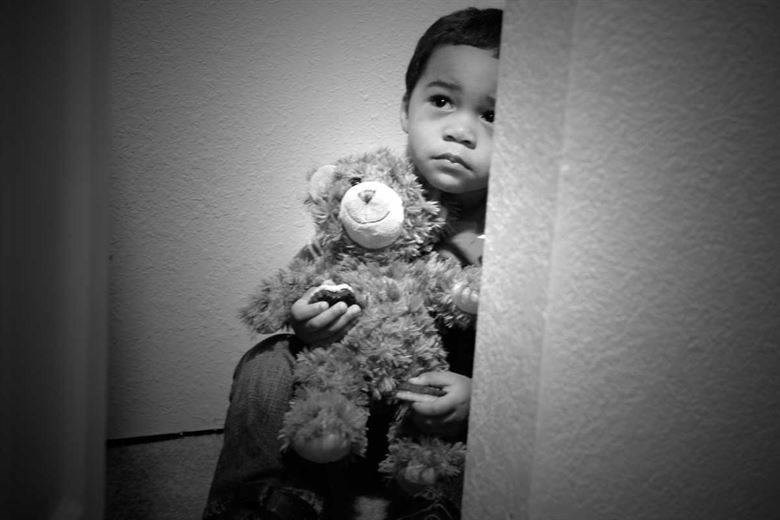For any child, name-calling and being bullied is an unfortunate byproduct of childhood. At school, kids hurl misnomers at each other, get teased for looking or being different and feelings get hurt -- it's all part and parcel of growing up.
But what about at home? Do parents realize that they can cause as much damage at the dinner table than kids in a school hallway or playground?
I distinctly remember being bullied in Catholic grammar school for either my thick braids (adorned with a matching ribbon and hair clips --thank you very much), or horn-rimmed glasses (de riguer now), heavy wool plaid uniform (rock stars wear them, don't they?) or my burgundy Bass penny loafers (nerd perfection.) Yet, when I got home, my mom provided a warm and reassuring environment. She was strict but never condescending, a disciplinarian but not an oppressor.
Words do matter to the ears they land on, particularly if they are young and impressionable.
Remember that English rhyme "Sticks and stones will break my bones, but names will never harm me?" Coined back in the 1800s, I believe that sentiment is as out of touch as the phonograph. Words do matter to the ears they land on, particularly if they are young and impressionable -— like a child's or even to an unborn baby. While pregnant, I remember my husband and I playing all kinds of music, particularly classical, and speaking to our son, Wade, on a regular basis. Late one night after completing a few laps in my belly, his dad then spoke softly and reminded him it was time to sleep. And sure enough he listened.
According to the Proceedings of the National Academy of Sciences of the United States of America, newborns can hear their mother's voice and heartbeat before birth as early as 16 weeks. So, if a child hears from the womb, and we spend millions of dollars on prenatal products such as pregnancy headphones, why isn't it just as important to watch what we say to them as they grow? Why does this concern seriously wane? Shouldn't we approach our communication with our children as carefully as we do with our co-workers?

As adults, I believe we make adjustments in our everyday lives when necessary. A Dutch-based feminist group called De Bovengrondse decided to circumvent the usual bureaucratic nightmarish process of changing a street name and handle it themselves. Tired of the male-centric names, they decided to rename about 43 main streets after accomplished women -- and not continue with the practice of using the names of Greek goddesses or the wives of famous men. They recognized the unseen power of repetition in which the use of names becomes second nature regardless of the logic behind it. Eighty-eight of Dutch streets carry male names, but do they actually reflect the society they represent?
A child's misbehavior does not necessarily reflect who the child intrinsically is, so why label them unfairly?
What we say requires a habitual closer look in order to determine if it actually reflects the truth. A child's misbehavior does not necessarily reflect who the child intrinsically is, so why label them unfairly?
Whether intentionally or not, I've witnessed parents in a fit of anger or frustration call their child a "fool," "dimwit," "stupid," "monster" or an "idiot" and then are shocked when their children actually end up manifesting these descriptions. Surely there must be a better way of addressing and resolving a pattern of negative behavior without being demeaning? Virginia Satir, an American author and family therapist reminds us that "every word, facial expression, gesture or action on the part of the parent gives the child some message about self-worth."
As parents, my husband and I make a concerted effort to call our teenage son by his name and no other, well, kind of. Confession: I also give him nicknames that should remind him how much I love him and how much he truly means to me. Names like my "noodle," "gumdrop," "love nugget" and "sugar bump" are completely embarrassing and acceptable names I use often -- and in front of his friends!

The other day, I met up with a friend, and as we walked down the street, she cut into my conversation mid-sentence and stood still: "Did I tell you what that monster did?"
Alarmed, my heart skipped a beat. Could she have been talking about our president's latest twitter rant? A defrocked priest? The disgraced former congressman recently released from prison? Or maybe she was referring to her boss or mother-in-law?
"No what? Wait, who?"I asked.
"Jason. That little **** broke my antique vase!"
I have to admit the vase was beautiful, and it will be missed. But that didn't bother me as much as that she rarely called her son by his name. Instead, she called him objects that I don't think anyone would want to be associated with such as dollops of bodily waste, a sci-fi creature or a kind of parasite, just to name a few.
As parents, we should always be positive reinforcers and be particularly circumspect in what we say and how we say it.
I am not implying that we should mollycoddle our children when they do something wrong, but as parents, we should always be positive reinforcers and be particularly circumspect in what we say and how we say it. Do we realize that every word uttered is heard and retained -- for later use. Will your child remember that you encouraged or discouraged them?
Inarguably, being a parent has got to be the most challenging job that doesn't even go on a resume, but it is a blessing. Your behavior, looks, mannerisms, quirks, etc. are miraculously replicated and fused with your partner's DNA and, if all goes well, another healthy human being is created. No car, object, home -- nothing, nada -- can compare to that individual looking back at you, which you helped create. So why then, would a parent carelessly call this priceless creation anything but perfection?
Back to the vase - "So, what did you tell Jason?" I asked.
"Well, I told that little f**** that if he ever did that again, I would kill him," she replied.
I zoned her out and was now slightly alarmed. Did she just imply that her son was now sexually active? And was she also implicating herself in pre-meditated filicide? Should I have addressed my concerns?
Why would parents carelessly call their child, this priceless creation, anything but perfection?
Not sure. Calling out a parent on how they address their own child is pretty much verboten and risky. You may be well-intentioned but invariably children get unintentionally compared, resentment may ensue and feathers will get ruffled. But maybe a comment could result in a parent reflecting on how they could better communicate with their child? I'll leave you, dear parent, to make that call.
When Halloween was approaching, I was having a drink with Jason's mom while discussing costumes for the boys. Mine wanted to be a pirate, again...!
"So, what did Jason say he wanted to be?" I asked.
She sipped her martini and sighed. "I don't understand it, he said he wanted to be a pile of shit."
Check, please!




